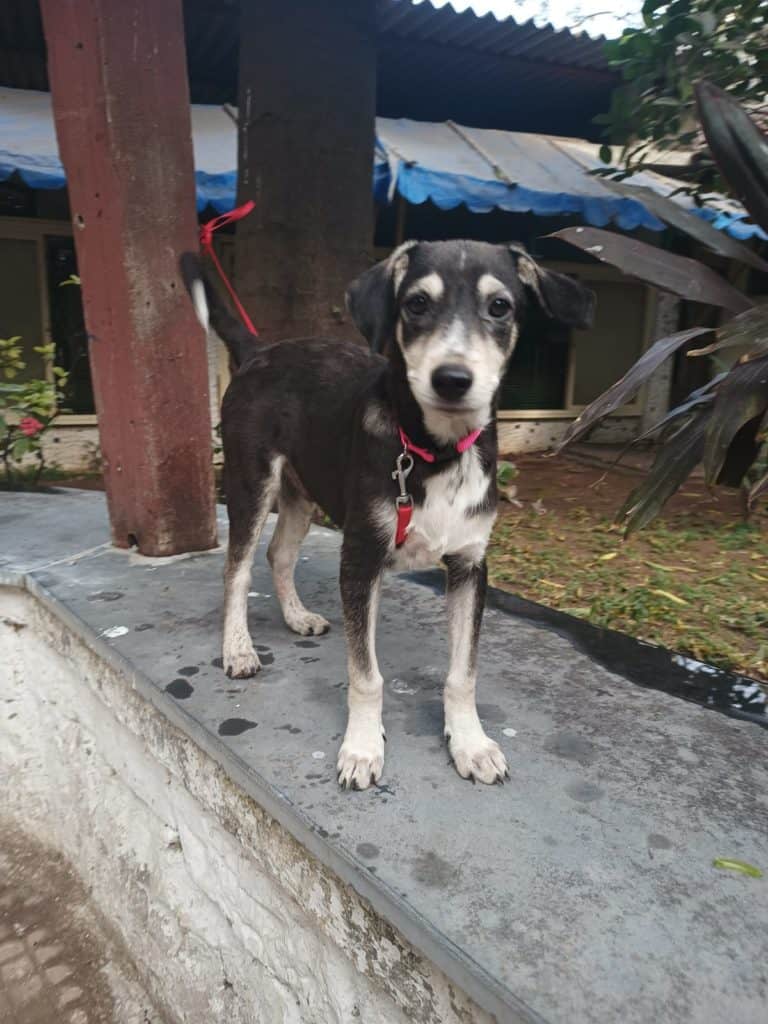When I moved to my current apartment building in Kandivali in January 2018, I noticed a couple of malnourished dogs in the neighbourhood. I started cooking food to feed them and nurture them back to health. Soon after, I was tending to 12 dogs from the initial 2. As of 2022, I’ve been tending to 62 dogs and 9 cats every day, and during the COVID lockdown at least 75 dogs came to me since their original territories – restaurants, food stalls – were all shut. Now that things are back to normal, most of them have returned.
I have treated stray dogs and cats whenever needed, directly on the roads, as well as by taking them to vets, admitting them to hospitals and/or finding them foster homes. I have treated them for a host of ailments like maggot wounds, bite injuries, road accidents, burns, kidney failures, distemper, abscess, tick fever, fractures, cancer, etc.
I also personally oversee the sterilisation of many, since this is an important exercise in ensuring not only the health of stray animals but also in regulating their population, which is only growing.
No effort from the BMC
The number of stray animals in Mumbai is currently over 2,50,000, out of which only 90,000 have been neutered since 2016. With little to no effort from the Brihanmumbai Municipal Corporation (BMC), the work of rescuing and caring for dogs has become more expensive and harder to manage for animal activists.
While the civic body oversees the Animal Birth Control (ABC) programme, an initiative to control the street dog population in all states of India with the help of NGOs, the work on the ground is poorly managed. One rarely sees municipal vans coming to take dogs for vaccination and neutering in Kandivali.
Read more: How to deal with rabid dogs in your area
Under the programme, stray animals are sent to public dispensaries for care. But in reality, these attempts prove to be futile. Many die because they come back with a host of infections. The unsanitary conditions in public hospitals – lack of maintenance, exposure to other sick dogs and unclean operating tools – are the cause.
A self-funded exercise
Against the backdrop of this, I and other animal activists have sterilised over 100 dogs in the neighbourhood. Neutering each dog can cost up to Rs 5000, an expensive undertaking, but important nonetheless.
We put most of the animals back to their original locations post-treatment. Dogs, in particular, are territorial and we need to respect that, however, the ABC programme rarely carries this out. In some cases, I need to find them homes or shelters, when they are not fit to be put back on the streets. I have adopted two animals in my own house, both of them victims of accidents. All of these expenditures are paid out of pocket, but in the case of a few, the costs were high for me to cover alone so I had to rope in a few of my college friends who are also dog lovers to contribute to the cause and help out with expenses.

Additionally, I oversee a vaccination drive for the strays once a year. We do on-ground vaccinations for the dogs since taking each one to the vet is not feasible. We buy 7-in-1 vaccines in bulk – they protect dogs from Canine Distemper, Hepatitis, Corona Viral Enteritis, Parainfluenza, Parvovirus and Leptospirosis, and each costs roughly Rs 200-250.
For rabies and annual booster doses, we hire a veterinary assistant for half a day, pay her Rs 2500 to administer the vaccinations. We also utilise help from other activists and feeders to catch the dogs to bring them for vaccination.
Challenges
With the number of animals needing care increasing every day, executing this work is huge financial pressure on one person. There is the additional obstacle of housing society associations, who object to caring for strays as they believe they cause a menace in housing complexes. Many activists and feeders face harassment from building residents.
The fact is, proper care and medical services for stray animals are equally beneficial to residents who can peacefully coexist with them, without the risk of injury or infection. Dog feeders are doing a service in this regard since hungry dogs can be aggressive.
Legally, citizens have the right to feed animals and birds according to the guidelines of the Animal Welfare Board of India, backed by the Supreme Court, and anyone contesting this should be penalised.
How you can help
- You can get in touch at +91 9324915288 to understand how to help dogs in your neighbourhood or donate for the cause.
- Stray animals live on the streets of Mumbai in hunger and pain, through extreme rain, cold weather and heat. Without access to water, many develop kidney issues as well. You can provide them with makeshift shelters in shop fronts or society garages, put water and food out for them in areas around you they frequent.
- From a long run perspective, it is extremely important to not only feed and care for the stray animals in your neighbourhood, but also to conduct periodic sterilisation drives. Given the inefficiencies in the municipality-run animal birth control programme, you could help the stray population by personally collaborating with NGOs or veterinarians to get them neutered. To know more, get in touch at the above number.